Dialogue continues between participants of the Incident Prevention and Response Mechanism, IDPs and conflict-affected women
Date:

UN Women continues to support regular information-sharing meetings and to facilitate dialogues between the Georgian participants of the Incident Prevention and Response Mechanism (IPRM) and representatives from women’s civil society organizations, internally displaced persons (IDPs) and conflict-affected women.
With the support of UN Women, on 18 May, the Office of the State Minister of Georgia for Reconciliation and Civic Equality, in cooperation with the State Security Service, held another meeting in Zugdidi between the Georgian participants of the IPRM and the representatives of women’s civil society organizations, as well as displaced and conflict-affected women.
In her opening remarks, the State Minister for Reconciliation and Civic Equality, Ms. Tea Akhvlediani, emphasized the importance of women’s increased involvement and role in the peacebuilding process, which represents one of the main priority directions of the reconciliation and engagement policy. While speaking about the human rights and humanitarian situation in the occupied territories of Georgia and near the Administrative Boundary Line (ABL), the State Minister stressed the importance of the Geneva International Discussions and the functioning of the IPRM.
The meeting was attended by 35 women, and the discussions evolved around the issues of increasing the role of internally displaced and conflict-affected women in peace and confidence-building processes. In addition, specific issues related to human security were raised, and the IPRM representatives were requested to provide a response to the problems accordingly. It is also important to mention that the participating women presented a number of interesting initiatives. For example, Kristine Ezugbaia, a resident of the village of Rukhi (along the ABL), suggested the idea of creating a “House of Friendship”—a space where people travelling from Abkhazia-can rest before continuing their journey. Kristine expressed readiness to provide her own house as a space for this purpose.
The final part of the meeting was devoted to discussions around the situation in the occupied territories and the villages near the ABL with regard to the needs of the local population, including conflict-affected women.
The meeting was organized as part of the UN Women project “Accelerating Implementation of the Women, Peace and Security Agenda in Georgia”, generously funded by the Conflict, Stability and Security Fund (CSSF) of the UK Government.